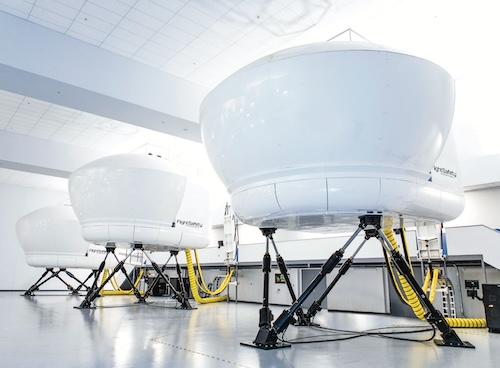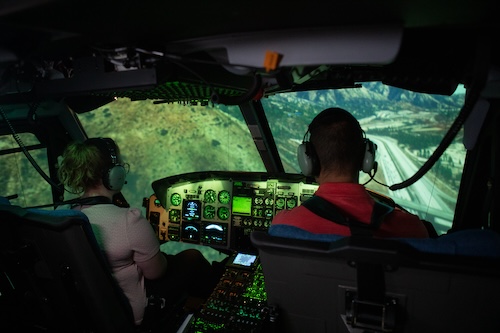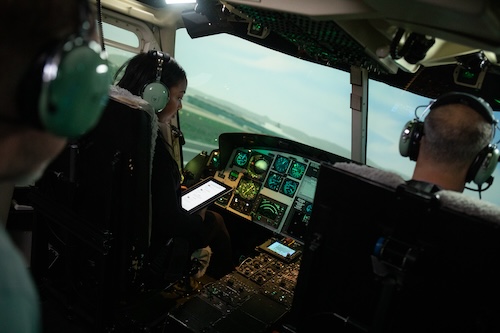|
Aug
06
2024
|
|
Posted 1 years 199 days ago ago by Admin
|
|

Maximize Your Helicopter Training
Training is foundational to every flight. Incorporating simulators or flight training devices (FTD) into your training regimen can remove the potential risks of in-aircraft training plus bring added effectiveness and lowered costs.
Safer, Smarter Environment
Compared with simulator training, in-aircraft training entails substantial drawbacks such as liability issues, avoidable wear and tear on the aircraft, and the inability to practice various types of critical emergencies.
Properly practicing a scenario in a simulator rather than imagining one in the aircraft could mean the life-saving difference during an actual crisis when the safety of those onboard comes down to split-second decisions. Simulators offer a safe platform for practical and comprehensive training, from performing the very basics to rehearsing the rare and unexpected.
Using state-of-the-art technology, normal and abnormal procedures can be simulated using a wide variety of aircraft, weather and environmental conditions without risk. Adverse and emergency events happen just as they would in the actual aircraft, presenting valuable practice opportunities.

Practice and Practice Again
In the simulator or FTD, pilots and instructors can practice scenarios repeatedly without delays from air traffic, weather conditions or ATC. The simulator replicates the exact conditions needed for the training objective and encourages quick repetition of events and skills to build proficiency.
It also allows the pilot and instructor the ability to pause and discuss at any point. There’s no concern around airport congestion or fuel when it comes to redoing scenarios. With the simple push of a button, you have the time and capability to get it right and ensure confidence and preparedness coming out of each scenario.
Simulator training is not contingent on weather either. With FlightSafety simulators, diverse flight environments can be created instantly 24/7/365.
Reducing Any Glaring Risk
Simulation-based training is the safer and better value when all costs are considered. Direct operating costs (including fuel), additional maintenance requirements, unnecessary risk exposure and time lost to air traffic or weather considerations all inflate the true cost of in-aircraft training.
Another downfall is potential exposure to incidents and accidents, which subjects your aircraft and crew to unnecessary risk. That can generate liability for the aircraft operator, whereas simulators provide a secure, controlled training environment.
Helicopters used for inflight training can also be subject to increased maintenance requirements. In training mode, the aircraft is easily exposed to excessive wear, creating the need for additional servicing. Engine and system exceedances may reduce the useful life of your aircraft and cause premature component replacement.

Industry-Leading Technology
FlightSafety pioneered the development and use of Level D simulation – the pinnacle of simulator technology – for the best, most effective rotorcraft training possible. Using proprietary high-fidelity graphics and worldwide visual database, training devices offer a great deal of operational flexibility that allow FlightSafety to customize each scenario specifically to your flight profiles.
And to ensure courses remain relevant and effective, FlightSafety closely collaborates with the OEMs, integrating their technology and aircraft updates in real-time. As the factory-authorized training provider for Sikorsky Aircraft, FlightSafety operates full complements of Level D simulators for Sikorsky models, offering type-specific, fully qualified instruction.
These strategic partnerships bring valuable and informed OEM data and insights to the development and upkeep of each training program. FlightSafety Defense, in coordination with GDIT, also supports the U.S. Army's training mission at Fort Novosel, AL, the world's largest rotor-wing simulator training facility.
The More Effective Alternative
If your flight operations’ primary mission isn’t to support training, save your aircraft for its primary, revenue-generating mission. Even slight damage to the aircraft during training can take it out of service while expensive repairs are completed. Simulation-based training provides a safe, focused and more realistic training environment, reducing the risk to your aircraft and crew.
LEARN MORE ABOUT FLIGHTSAFETY INTERNATIONAL
#sponsoredcontent
READ MORE ROTOR PRO: https://justhelicopters.com/Magazine
WATCH ROTOR PRO YOUTUBE CHANNEL: https://buff.ly/3Md0T3y
You can also find us on
Instagram - https://www.instagram.com/rotorpro1
Facebook - https://www.facebook.com/rotorpro1
Twitter - https://twitter.com/justhelicopters
LinkedIn - https://www.linkedin.com/company/rotorpro1